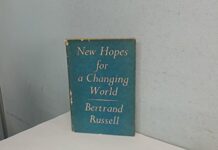
Ebook Info
- Published: 2004
- Number of pages: 258 pages
- Format: PDF
- File Size: 0.88 MB
- Authors: Bertrand Russell
Description
The key to human nature that Marx found in wealth and Freud in sex, Bertrand Russell finds in power. Power, he argues, is man’s ultimate goal, and is, in its many guises, the single most important element in the development of any society. Writting in the late 1930s when Europe was being torn apart by extremist ideologies and the world was on the brink of war, Russell set out to found a ‘new science’ to make sense of the traumatic events of the day and explain those that would follow. The result was Power, a remarkable book that Russell regarded as one of the most important of his long career. Countering the totalitarian desire to dominate, Russell shows how political enlightenment and human understanding can lead to peace – his book is a passionate call for independence of mind and a celebration of the instinctive joy of human life.
User’s Reviews
Editorial Reviews: Review ‘Extremely penetrating analysis of human nature in politics’ – The Sunday Times’An acute and learned study.’ – The Economist About the Author Samuel Brittan
Reviews from Amazon users which were colected at the time this book was published on the website:
⭐Reading this book is an education in itself. Power may not be the key to understanding all social life in the way Russell ambitiously tried to show, but it certainly explains a lot, and Russell’s beautiful prose convincingly weaves together the various types of power to give a powerful theory indeed, all backed up with brilliantly concise historical example. Read it as a history lesson alone in fact. This is a great book.
⭐I feel this book has too much vague history, e.g. in the village there was autocracy/democracy/fill in the blank. I agree with his thesis that power is a fundamental quantity that should be studied, like energy in physics, and that it’s better to talk about desire for power than just economic power or political power. I also liked how he says that religious leaders are not really power abdicating unless we don’t know about them; if I make a point of starting to spread my creed then I’m really not someone who wants to retire from the world. Kind of like how if you make a donation in your name, then it’s partly inspired by love of respect. Followers follow a leader because they feel it’s the best way to get a share of power. Devolution of government is a good way to solve problems whenever possible.The following page numbers refer to the Allen & Unwin edition of the book.p. 139: “If, in the name of Reason, you summon a man to alter his fundamental purposes- to pursue, say, the general happiness rather than his own power- you will fail, and you will deserve to fail, since Reason alone cannot determine the ends of life.”p. 299: “The temper required to make a success of democracy is, in the practical life, exactly what the scientific temper is in the intellectual life. Truth, it holds, is neither completely attainable nor completely unattainable; it is attainable in a certain degree, and that only with difficulty.”p. 300: “Expose children to the most vehement and eloquent advocates on all sides of every question, past and present! Then have the children summarize the arguments used. This will gently show that eloquence is inversely proportional to solid reason. Learn from advertisers, who have led the way in the technique of producing irrational belief. Education should counteract this natural credulity, the habit of believing an emphatic statement without reasons, and of disbelieving an unemphatic statement even when accompanied by the best of reasons. Give them sweets, one with awesome ads and one with scientific data; or vacations, etc. Warn them that all of them, unless they are very carefull to cultivate a balanced and cautious judgement, may fall overnight into a similar madness at the first touch of government incitement to terror and bloodlust.”p. 302: “Through music or poetry, history or science, beauty and pain, the really valuable things in human life are individual, not such things as happen on a battlefield or in the clash of politics. Community life is necessary, but as a mechanism not as something to be valued on its own account. This is analogous to what all the great religious leaders have spoken of. We all reach our best in different ways, and the emotional unity of a crowd can only be achieved on a lower level.”
⭐Bertrand Russell thought the key factor motivating men and nations was power. In this work he covers a wide variety of expressions of power, from the economic to the political, and delves deeply into the various ways that power has been expressed and exercised – in the church, in ancient societies (shamans, for example) and in other institutions. Much of what he says regarding the sources of power apply today as they did back in pre-World War Two days, when the book was written. Russell is very astute about human nature. A man as well read as him in the early part of the 20th Century is very impressive, as he uses a wide variety of sometimes surprising references – works on economics and psychology, for example, that are not common today. He also alludes to political events that one would think would not be on the top of his list: the political situation in Mexico, for example. Russell was also known for his wit, and he exhibits it here sharply, taking on philosophers and the hierarchy of the Anglican church. The introduction to the book, written by Samuel Brittan, warns the reader that Russell overreached in thinking he discovered the key factor that explains human behavior. Brittan is probably right, but the book is well worth reading for the depth of thought and knowledge expressed by one of the most prolific minds of the 20th century.
⭐As always, Russell shines with his clarity and unwavering good sense, but most of the book is pretty dry. The last chapter is by far the most interesting (in which he describes how to tame power) and some of his suggestions are novel even for today. I thoroughly enjoyed the last chapter but it couldn’t make up for the many chapters of tiring text before it.
⭐Dull to read.I read many books of the same author, I liked most of them, but not this one.
⭐I am pleased with my order and the service provided, hence the five star rating.
⭐Expected it to be a better copy. Thank you.
Keywords
Free Download Power: A New Social Analysis (Routledge Classics) 1st Edition in PDF format
Power: A New Social Analysis (Routledge Classics) 1st Edition PDF Free Download
Download Power: A New Social Analysis (Routledge Classics) 1st Edition 2004 PDF Free
Power: A New Social Analysis (Routledge Classics) 1st Edition 2004 PDF Free Download
Download Power: A New Social Analysis (Routledge Classics) 1st Edition PDF
Free Download Ebook Power: A New Social Analysis (Routledge Classics) 1st Edition





